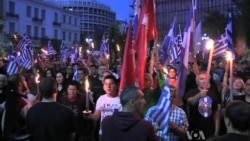LONDON —
Greece has pledged to crack down on far right party Golden Dawn after it was accused of involvement in the killing of a left-wing activist. The party denies any involvement. Golden Dawn is also accused of dozens of attacks on immigrants and its opponents. Political analysts see the party's growing support as a symptom of a so-called crisis of democracy in Greece.
There have been daily demonstrations in Athens and other Greek cities since the fatal stabbing of activist and rapper Pavlos Fissas Tuesday night.
The main suspect is a self-proclaimed supporter of Golden Dawn - though the party insists he is not a member.
On Thursday, Greek Prime Minister Antonis Samaras issued a warning. He pledged that his government is determined not to allow the descendants of Nazis to poison lives, to commit crimes, to terrorize, and to undermine the foundations of the country that gave birth to democracy.
Golden Dawn’s leader Nikolaos Michaloliakos strongly rejected those accusations.
"Golden Dawn has said that it condemns this specific tragic event and others." he said. "It condemns every act of violence. But this is not enough for the ‘holy inquisition’ of Greece in 2013, created by this bailout government. They should know that they will not succeed in their plans."
Greek police have asked for permission to check Golden Dawn lawmakers’ phone records on the night of the killing. Local media say prosecutors are investigating 32 allegations of violent attacks by party members.
Authorities are using existing legislation to take on Golden Dawn, rather than trying to ban the party, says Dionyssis Dimitrakopoulos of Birkbeck College, University of London.
“First of all, use criminal legislation and secondly, use the counter-terrorism legislation and squad that exists in Greece, which is foreign-trained… They [Golden Dawn] behave from what I can see like a criminal gang," he said. "And a case could possibly be made that in fact, this is a terrorist group.”
Golden Dawn caused shock waves when it took seven percent of the vote in 2012 to become Greece’s third biggest party. Its campaigns are fiercely anti-immigrant.
Party supporters wear black tops and military fatigues; their symbol closely resembles a swastika.
But Golden Dawn denies being a neo-Nazi movement.
“There is some support for this neo-Nazi group even in parts of Greece where there is no direct major problem of criminality...or significant numbers of illegal immigrants,” said Dionyssis Dimitrakopoulos.
The traditional explanation is that, at times of economic crisis and soaring unemployment, Greeks are turning to extreme politics. But Dimitrakopoulos says there is a deeper cause rooted in the political response to the debt crisis.
“The Greek political establishment no longer commands the legitimacy that it used to command or it should command," he said. "So ordinary Greeks, at least between elections, find it too easy to say that they would consider voting for that kind of party.”
In January, Greece takes over the rotating presidency of the European Council, and political analysts say the government is desperate to show that it is capable of fighting extremism.
There have been daily demonstrations in Athens and other Greek cities since the fatal stabbing of activist and rapper Pavlos Fissas Tuesday night.
The main suspect is a self-proclaimed supporter of Golden Dawn - though the party insists he is not a member.
On Thursday, Greek Prime Minister Antonis Samaras issued a warning. He pledged that his government is determined not to allow the descendants of Nazis to poison lives, to commit crimes, to terrorize, and to undermine the foundations of the country that gave birth to democracy.
Golden Dawn’s leader Nikolaos Michaloliakos strongly rejected those accusations.
"Golden Dawn has said that it condemns this specific tragic event and others." he said. "It condemns every act of violence. But this is not enough for the ‘holy inquisition’ of Greece in 2013, created by this bailout government. They should know that they will not succeed in their plans."
Greek police have asked for permission to check Golden Dawn lawmakers’ phone records on the night of the killing. Local media say prosecutors are investigating 32 allegations of violent attacks by party members.
Authorities are using existing legislation to take on Golden Dawn, rather than trying to ban the party, says Dionyssis Dimitrakopoulos of Birkbeck College, University of London.
“First of all, use criminal legislation and secondly, use the counter-terrorism legislation and squad that exists in Greece, which is foreign-trained… They [Golden Dawn] behave from what I can see like a criminal gang," he said. "And a case could possibly be made that in fact, this is a terrorist group.”
Golden Dawn caused shock waves when it took seven percent of the vote in 2012 to become Greece’s third biggest party. Its campaigns are fiercely anti-immigrant.
Party supporters wear black tops and military fatigues; their symbol closely resembles a swastika.
But Golden Dawn denies being a neo-Nazi movement.
“There is some support for this neo-Nazi group even in parts of Greece where there is no direct major problem of criminality...or significant numbers of illegal immigrants,” said Dionyssis Dimitrakopoulos.
The traditional explanation is that, at times of economic crisis and soaring unemployment, Greeks are turning to extreme politics. But Dimitrakopoulos says there is a deeper cause rooted in the political response to the debt crisis.
“The Greek political establishment no longer commands the legitimacy that it used to command or it should command," he said. "So ordinary Greeks, at least between elections, find it too easy to say that they would consider voting for that kind of party.”
In January, Greece takes over the rotating presidency of the European Council, and political analysts say the government is desperate to show that it is capable of fighting extremism.





